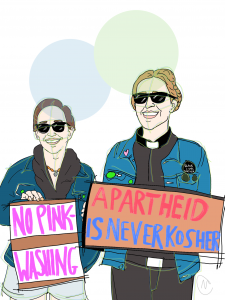18 No One is Disposable: Ecofeminism and Climate Crisis
By Nicole Morse and Daniella Orias, Florida Atlantic University


Amid climate crisis, Gender, Women, and Sexualities Studies (GWSS) scholars can access crucial tools through cultivating the theory and practice of ecofeminism.[1] Unfortunately, these resources are neglected when ecofeminism is narrowly imagined as essentialist and reductively stigmatized as lacking intellectual rigor (Gaard 2011). Through dialogue with Indigenous feminisms, Earth-based knowledge traditions, spiritualities from Europe, and many other philosophies, ecofeminism critiques the structures producing climate crisis, including disposability—the idea that beings, spaces, resources, and the Earth can literally be discarded.
At Florida Atlantic University (FAU), built on the lands of the Tequesta and Seminole nations in South Florida, our location demands that we attend continuously to the signs of climate change and to the effects of accelerating climate crisis—as well as to our role in the history of settler-colonialism. Both of us discovered ecofeminism through FAU’s Center for Women, Gender & Sexuality Studies and its commitment to feminist environmental justice. We are two white, queer Jewish scholars, one an Assistant Professor (Nicole Morse, they/them), and the other a graduate student (Daniella Orias, she/her). We believe that white scholars on stolen land must challenge disposability, thereby fulfilling our responsibility to act as accomplices to Indigenous movements.
Unlike allies, accomplices are complicit in struggles against systemic power because accomplices understand that—as Audre Lorde, Lilla Watson, and many other organizers have taught us—our own liberation is inextricable from the liberation of all. Accomplices take risks; for example, as Jewish scholars, we risk exclusion from family and community when we critique the Israeli government’s apartheid system. Yet disposability does not just maintain border walls, carceral (in)justice, and capitalist production models; it organizes our work within academia (from precarious labor to student debt) and undergirds many of our social justice practices (from cancel culture to punitive solutions).
Ecofeminists seek to liberate women, gender/sexual minorities, and the Earth from capitalist and kyriarchal subordination through recognizing that patriarchy is only one form of “domination” (archein) by those who believe themselves to be “lord” or “master” (kyrios). Some ecofeminist scholars are justifiably critiqued for furthering the settler-colonial project of appropriating Indigenous cultures. At the same time, critical reactions to ecofeminism, such as Feminist Political Ecology, have all too often neglected those Indigenous scholars who have made major contributions to ecofeminism (Rocheleau and Nirmal 2015, 797). Ecofeminism is distinct from Indigenous feminisms because of its roots in Western European cultures. Its internal critique of the values of minority-world cultures, including disposability, is an urgent call toward decolonization. Ecofeminism is not merely additive, introducing “and nature” to the long list of those harmed by kyriarchy; instead, it is constitutive. Ecofeminism argues that harm done to the Earth is inseparable from sex- and gender-based oppression (Adams 2007, 1).
Ecofeminism(s): Past and Present
My (Daniella) connection to ecofeminism can be traced to two memories. The first is my desire to connect with nature as a child, and the second is discovering the term in academia. As a child, I often questioned my relationship to the world around me. I believed that in order to fully connect with the world, you had to be a part of it—this often meant coming home covered in the very Earth with which I longed to converge. This constant need to connect with nature and my desire to question humans’ relationships with the natural world fascinated me. It was not until I entered college at FAU and took Jane Caputi’s “Green Consciousness” course, a class that reflected on these philosophies, that I was able to put a name to the feelings of connectedness I often sought in nature: ecofeminism.
Drawing from diverse forms of Earth-based knowledge practices, ecofeminism interrogates how cultural shifts—from the emergence of agriculture to the enclosure of the commons to chattel slavery and colonialism—produce kyriarchical oppression of living beings and the Earth (Ladha and Kirk 2016). Outside academia, the idea that challenging and questioning patriarchy is deeply connected to the environment has long been present in activist movements; in the academy, ecofeminism is compatible with environmental studies, but its intersectional analysis of power and oppression can most powerfully be nurtured within GWSS.
“Ecofeminism” first appeared in Le féminisme ou la mort (1974), though its theoretical insights extend beyond the history of the term itself. Conferences on ecofeminism began appearing throughout the world in the early 1970s (Gruen and Gaard 1993); as dialogue about ecofeminism proliferated in scholarship, popular culture, and movement work, the field emerged as one that has been and remains diverse and ever-evolving. Between the 1970s and 1980s, a wide range of ecofeminist texts influenced the initial development of the field, including Rosemary Radford Ruether’s New Woman New Earth (1975), Susan Griffin’s Woman and Nature: The Roaring Inside Her (1978), and Carolyn Merchant’s The Death of Nature (1980).
Amid vibrant debate and discussion, a prevalent theme appears in these early works: the split between humans and nature that is simultaneously propelled by and sustains kyriarchy. As Carolyn Merchant (1980) writes, the scientific revolution established a “mechanistic worldview” that replaced the “organic worldview” that pre-dated the 17th century (1). Founded upon domination, the mechanistic worldview treats resources—from humans to non-human animals to the Earth—as instrumental and disposable. Rosemary Ruether’s New Woman New Earth (1975) explains that such instrumentalization both relies upon and produces intersecting forms of oppression and domination, from sexism to racism to environmental destruction. Challenging the mechanistic worldview, ecofeminism theorizes how harm to the Earth is inextricably connected to oppression of women and gender/sexual minorities.
We can comprehend what has seemed to separate humans from nature, and by understanding this separation, we can begin to heal this divide. As Greta Gaard (1993) points out in Ecofeminism: Women, Animals, and Nature:
Ecofeminism’s basic premise is that the ideology which authorizes oppressions such as those based on race, class, gender, sexuality, physical abilities, and species is the same ideology which sanctions the oppression of nature. Ecofeminism calls for an end to all oppressions, arguing that no attempt to liberate women (or any other oppressed group) will be successful without an equal attempt to liberate nature. (1)
As an intersectional approach, ecofeminism comprehensively analyzes how oppression and environmental harm are intertwined. Contemporary ecofeminism is responsive to critiques of essentialism (O’Loughlin 1993, 148). For example, ecofeminist Greta Gaard (1997) challenges the early feminist focus on the dualism between male/female and instead proposes the idea of decentering gender and moving “Toward(s) A Queer Ecofeminism.” Sistah Vegan by Breeze Harper (2012) articulates a theory of “ecowomanism” that explores how veganism, race, and the environment intersect. At FAU, our ecofeminist scholars include Jane Caputi (2020), whose forthcoming book draws on many different Earth-based philosophies to produce “a deliberately dirty-minded manifesto,” and vegan ecofeminist S. Marek Muller (2020), whose work interrogates how rhetoric constructs the categories of “human” and “animal” such that some beings become disposable.
Ecofeminism(s): Against Disposability
“No one is disposable” is a value that I (Nicole) learned through prison abolition organizing. Disposability supports our practice of caging people, and it sustains systems that make certain beings more disposable—more killable—than others (Agamben 1998). Although people of all races and all socioeconomic classes cause great harm to each other, prisons are full of those whose race, gender nonconformity, dis/ability, and poverty are used by kyriarchy to mark them as disposable (Stanley et. al. 2012). Of course, disposability is not only about turning people into waste. Climate crisis is the result of policies and practices that treat the Earth hirself as disposable. Disposability generates profits and makes an ecologically unsustainable drive toward continuous growth manageable—at least for now (Bales 2012; Patel and Moore 2017).
Disposability is a social construct. As Carol Adams (2004) writes, disposability requires objectification, for when systems turn “someone” into “something,” these beings can then be “seen as consumable, as usable” (14). Within academia, disposability demands contingent labor, graduate student precarity, and unending growth and productivity. Disposability frames those who identify problems in the academy—from campus sexual assault, to racist microaggressions, to inaccessible buildings, to gentrification—as the problem (Ahmed 2017). Opposing disposability demands that we deconstruct social, economic, and political systems that benefit some at the expense of others—including the structures that shape academia as we currently experience it.
Ecofeminism(s) and GWSS: Reasons for Hope
This article is dialogic, and in our conclusion, we want to expand its multi-vocality through unpacking longer quotations from ecofeminist authors who guide our work.
The opportunity still exists for relationships founded in respect for all those with the vision, will and courage to pursue decolonization. In this regard, there is the possibility of a dialogue between Indigenous peoples and ecofeminism provided ecofeminists can shift to a way of being that embodies respect for Indigenous women’s sovereignty. And out of such dialogues, just futures are born. ~ Ambelin Kwaymullina (2018, 13)
As GWSS scholars, one of our central tasks is to dismantle disposability, not to further its logic by appropriating Indigenous teachings. We must resist the assumption that our culture(s) are barren and that we can only find resources to support us in this task by taking from others. For myself (Nicole), my ecofeminist commitments emerge from the mitzvah of tikkun olam—healing the world. To adapt a lesson from Rabbi Tarfon, it is not our duty to complete the work, but neither are we free to desist from it.
There’s a lot of hope. On a daily basis, I cultivate hope, not in an illusionary way but in a dedicated way of saving seed, spreading the infection among others for loving life on earth in all its diversity and pluralism…. There is society and we have to cultivate it on a daily basis. And there’s hope for me in the fact that faster than the trends of destruction are the trends of a rediscovery of our humanity. ~Vandana Shiva
Often, when facing news of climate calamities and ongoing violence against women, it is easy to lose hope in humanity. Shiva reminds us that there is, in fact, hope. As society continues to face catastrophic shifts, hope inspires us to envision a sustainable future. I (Daniella) read “rediscovering our humanity” as an invitation to heal the human/nature divide and challenge the “trends of destruction,” rewriting the human-domination narrative as a narrative of respect and reciprocity.
Ecofeminism provides GWSS with a lens to analyze and challenge the human/nature divide. It allows us to envision moving forward into a space of inclusion, connection, and respect for all beings. Shiva urges us to cultivate hope “on a daily basis.” Cultivation, which evokes care for growing beings, implies an ongoing process that we must return to in order to effectively nurture the seeds of change.

Works cited:
Adams, Carol J. 2004. The Pornography of Meat. Brooklyn, NY: Lantern Books.
—–. 2007. Ecofeminism and the sacred. Continuum.
Agamben, Giorgio. 1998. Homo Sacer: Sovereign Power and Bare Life. Redwood City, CA: Stanford University Press.
Ahmed, Sara. 2017. Living a Feminist Life. Durham, NC: Duke University Press.
Bales, Kevin. 2012. Disposable People: New slavery in the Global Economy, Third Edition. Berkeley, CA: University of California Press.
Caputi, Jane. 2020. Call your “Mutha”: A Deliberately Dirty-Minded Manifesto for the Earth Mother in the Anthropocene. New York, NY: Oxford University Press.
Carson, Rachel. 1962. Silent Spring. Boston, MA: Houghton Mifflin Harcourt Publishing Company.
d’Eaubonne, Francoise. 1974. Le féminisme ou la mort. P. Horay.
Gaard, Greta. 1993. Ecofeminism: Women, Animals, and Nature. Philadelphia, PA: Temple University Press.
—–. 1997. “Toward a queer ecofeminism,” in Hypatia. 12(1): 114-137.
—–. 2011. “Ecofeminism Revisited: Rejecting Essentialism and Re-placing Species in a Material Feminist Environmentalism,” in Feminist Formations. 23(2): 26-53.
Gruen, Lori, and Greta Gaard. 1993. “Ecofeminism: Toward Global Justice and Planetary Health,” in Society and Nature. 2: 1-35.
Harper, Breeze. 2010. Sistah Vegan: Black Female Vegans Speak on Food, Identity, Health, and Society. Brooklyn, NY: Lantern Books.
Kwaymullina, Ambelin. 2018. “You Are on Indigenous Land: Ecofeminism, Indigenous Peoples and Land Justice,” in Feminist Ecologies: Changing Environments in the Anthropocene, ed. Lara Stevens, 193–208. London: Palgrave Macmillan.
Ladha, Alnoor and Martin Kirk. 2016. “Seeing wetiko: On Capitalism, Mind Viruses, and Antidotes for a World in Transition.” In Kosmos Quarterly: Journal for Global Transformation, (Spring/Summer). https://www.kosmosjournal.org/article/seeing-wetiko-on-capitalism-mind-viruses-and-antidotes-for-a-world-in-transition. [Accessed: 4/22/2020]
Merchant, Carolyn. 1980. The Death of Nature: Women, Ecology, and the Scientific Revolution. New York, NY: HarperCollins.
Muller, S. Marek. 2020. Impersonating Animals: Rhetoric, Ecofeminism, and Animal Rights Law. East Lancing, MI: Michigan State University Press.
O’Loughlin, Ellen. 1993. “Questioning Sour Grapes: Ecofeminism and the United Farm Workers Grape Boycott,” in Ecofeminism: Women, Animals, and Nature, ed Greta Gaard, 146-166. Philadelphia, PA: Temple University Press.
Patel, Raj and Jason W. Moore. 2017. History of the World in Seven Cheap Things: A Guide to Capitalism, Nature, and the Future of the Planet. Berkeley, CA: University of California Press.
Rocheleau, Diane and Padini Nirmal. 2015. “Feminist Political Ecologies: Grounded, Networked and Rooted on Earth,” in The Oxford Handbook of Transnational Feminist Movements, eds. Rawwida Baksh and Wendy Harcourt, 794-814. New York, NY: Oxford University Press.
Stanley, Eric A., Dean Spade and Queer (In)Justice. 2012. “Queering Prison Abolition, Now?” In American Quarterly. 64(1): 115-27.
- We would like to thank Luhui Whitebear for making the time to read this essay and offer her feedback. ↵

